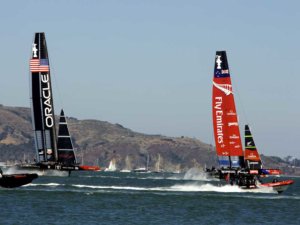In Sports, It’s Quants Versus Managers
As professional sports lean ever more heavily on data and analytics, the contest between experience and analytics is intensifying.
Topics
Competing With Data & Analytics
Today’s game is quants versus managers, and the outcome may go into overtime.
What’s at stake? Seemingly everything: trophies, revenues, funding and fans, not to mention the sheer thrill of victory, particularly when the game is elite professional sports. Where managers’ and owners’ “gut” once ruled, analytics insights are fast becoming a standard part of a coach’s playbook.
Even so, two recent sports examples showcase how difficult it is to balance analytics with experience, even with big investments in analytics.
In February 2014, The Wall Street Journal ran a story that details “one of the greatest comebacks in sports history:” Oracle Team USA’s dramatic win against Emirates Team New Zealand in the America’s Cup competition that took place in San Francisco Bay between the Golden Gate Bridge and Alcatraz Island:
Largely because of team owner Larry Ellison, the founder of software giant Oracle Corp. and one of the world’s richest men, Oracle had all the advantages conferred upon the incumbent, plus some. The 11 sailors were a collection of international superstars. The engineers who designed the yacht and the programmers who built the software used to plot strategy had no peer. Oracle’s computer simulations suggested the AC72 — which cost at least $10 million to build — wasn’t just the better boat in the final, it was the fastest sailboat ever to compete for the Cup, capable of 48 knots, or about 55 mph.
Team USA was predicted to out-sail New Zealand, even upwind. But, with the America’s Cup going to the first team to win nine races, Team USA was getting its tail whipped by Team New Zealand through the first seven.
Oracle Team USA’s problem was tactical: the data was telling Skipper Jimmy Spithill to do one thing — sail at a tighter angle to the wind — and his experience was telling him to do something else. Finally, in the eighth race, “with his team’s prospects getting dimmer by the hour,” according to The Wall Street Journal, “Mr. Spithill decided it was time to stop obeying the computers and start thinking like sailors.”
In a stunning upset, Oracle Team USA won the America’s Cup 9 to 8.

